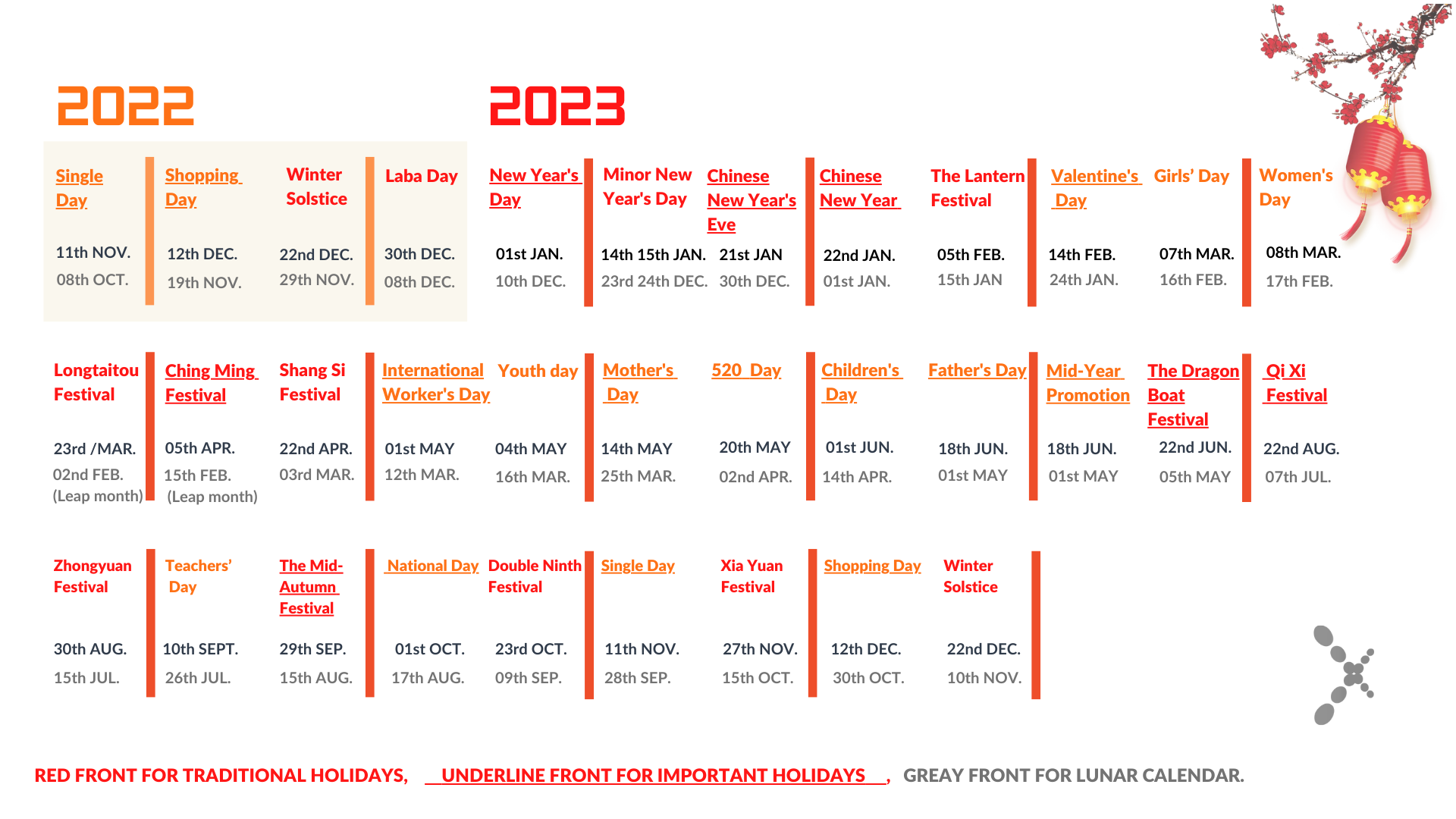Learn to tell the difference between the two calendars practised in China and the dates and customs of traditional Chinese cultural festivals. This will help you understand more about Chinese consumer habits and meet the particular needs of Chinese consumers for festivals.
Why is the Chinese New Year different every year?
In China, there are two calendars: the solar calendar and the lunar calendar. The solar calendar is the world’s standard calendar, while the lunar calendar has a highly complex algorithm. Every four years is divided into three common years (12 months) and one leap year (13 months including one leap month), which are divided into long months (30 days) and short months (29 days). Traditional Chinese festivals are mainly based on the lunar calendar, so the dates of the traditional Chinese festivals on the solar calendar vary yearly.
How holidays are celebrated in China
With the influence of social media platforms, many festivals have attained commercial value. Whether it is an emerging or a traditional Chinese festival, Chinese people like to show appreciation to their friends by giving gifts. Hence, a significant increase in consumer demand accompanies most celebrations. Understanding the dates and traditions of various Chinese festivals gives you an advantage when planning campaigns.
This article will introduce several traditional Chinese festivals and the schedule of festivals for 2023. Take advantage of the calendar to be prepared for when your Chinese customers are most willing to spend!
Traditional Chinese festivals and their dates for 2023.
New Year’s Eve – 21.01.2023
Chinese New Year (Spring festival) – 22.01.2023
Before the New Year, every family will thoroughly clean their house and put-up red lanterns and Chinese couplets. They will also buy new clothes for their families, prepare New Year’s gifts for relatives and friends, and buy plentiful food and snacks for their guests.
On New Year’s Eve, the family will sit together to have a reunion dinner and stay together to wait for the New Year. The next day is New Year’s Day, when people start visiting friends and relatives in the morning to wish them a good New Year, giving red envelopes to children and gifts to elders.
Qingming Festival – 05.04.2023 (The festival generally falls around the 5th of April of the solar calendar)
Qingming Festival is the most solemn ancestral worship festival of the Chinese people when young people visit the graves of their ancestors to clean them to pay tribute to their memory. Since this day is also one of the 24 solar cycles, this means that the solar cycles are shifting, and there is a high probability of rain.
Dragon Boat Festival – 22.06.2023
On this day, people hang cattail and mugwort leaves on their doors and eat food such as Zongzi (an exceptional dish made of glutinous rice wrapped in leaves) and salted duck eggs. People also hold dragon boat races in various cities to express their worship of dragons and their appreciation of Qu Yuan (a patriotic poet).
Qixi Festival – 22.08.2023 (07.07.2023 in lunar calendar)
According to the myth, a cowherd boy and a fairy were in love but could not be together for various reasons, so every year on the seventh day of July, magpies would build a bridge to heaven so that the cowherd boy and the fairy could meet each other. This has evolved into the Chinese Valentine’s Day, a day when couples and lovers go out on dates, go for dinner and a movie, and give each other gifts to celebrate the day.
Mid-Autumn Festival – 29.09.2023
The origin of the Mid-Autumn Festival came from the worship of the moon in ancient times, and the moon is usually full on this day. Families gather for dinner and eat “moon cakes”, which symbolise a great reunion and are used as a symbol of the moon and as gifts for friends and family. People will gather with family and friends to watch the full moon.
Double Ninth Festival – 23.10.2023 (09.09.2023 in lunar calendar)
The number 9 represents the highest Yang in the Yin-Yang system, so September 9 is also called “double 9”, a very auspicious day for praying and worshipping the gods. It has been passed down to the present day with the added connotation of respect for the elderly, and people also call this day “Senior Citizen’s Festival.” Younger generations usually phone and send gifts to the elderly on this day, hoping that they will live a very healthy and long life.
These are some of the most well-known festivals in China that offer an opportunity for your business to promote its product to Chinese consumers:

Boost sales during traditional Chinese festivals
Spring Festival, Qingming Festival, Dragon Boat Festival, and Mid-Autumn Festival are China’s most important traditional festivals. These festivals are legal holidays in China, and most people spend time with their families on these days.
Leading up to these festivals (excluding Qingming Festival), consumers will have a specific incentive to buy things for themselves or give their elders and friends gifts. This large market should not be underestimated. An increase in consumer demand usually accompanies these festivals.
How to prepare your business’ promotions for the major shopping days in the Chinese festival calendar
Take the upcoming Chinese New Year as an example; many Chinese people abroad would want to celebrate New Year with their families. The easing of China’s quarantine policies makes it much easier to return to China. It is very likely that many Chinese travelers will buy a good amount of luxury and European speciality goods to bring back to China as gifts for their families. Merchants should make appropriate marketing plans to target this group. Furthermore, for those who spend Chinese New Year abroad, merchants can launch promotions related to the Chinese New Year, combining elements that always accompany New Year’s, such as “good luck” and the colour red. Linking your brand to these fundamentals of celebratory customs will attract the attention of overseas Chinese.
Another example is Qixi Festival, as the primary participants who celebrate this festival are couples. Qixi focuses more on “the experience and story of being together.” Couples prefer to buy gifts with practical value and symbolic meaning for each other. In China, many companies associate their brands with the ” Qixi” theme and launch “Qixi” exclusive promotional products or activities to this target group. As a result, they position their brands with appropriate promotions for each celebration. By understanding the connotations behind different festivals, merchants can capture consumers’ needs for specific celebrations.
We will continue to publish articles to introduce each important festival in time to help merchants understand the stories behind the festivals and how Chinese people celebrate them. There are many possibilities for merchants to take advantage of the knowledge of the customs of traditional Chinese culture and the drivers of consumer purchasing behaviour. Understanding this dynamic allows businesses to launch promotions to attract consumers and gain their trust before the upcoming festivals.
Read more about our Chinese payments and marketing service.




